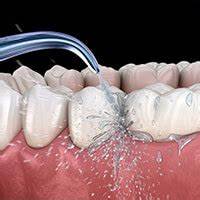
Exploring Flossing Alternatives: Are Water Flossers The New Trend
In the realm of dental hygiene, flossing has long been regarded as an essential practice for maintaining optimal oral health. Traditional flossing with dental floss or tape has been the go-to method recommended by dentists worldwide. However, as technology advances and consumer preferences evolve, alternative methods such as water flossers have gained traction as potential alternatives. But are water flossers truly the new dental trend? Let's delve into the benefits and considerations surrounding these innovative devices.
Advantages of Water Flossers
Water flossers, also known as oral irrigators or water picks, utilize a steady stream of pulsating water to remove plaque, food particles, and bacteria from between teeth and along the gumline. This technology offers several advantages over traditional flossing methods, which have contributed to its rising popularity among dental patients and professionals alike.
One of the primary benefits of water flossers is their effectiveness in reaching areas that traditional floss may struggle to access. The high-pressure water stream can penetrate deep between teeth and into tight spaces, providing a thorough and comprehensive cleaning that helps prevent cavities and gum disease. This superior cleaning action is particularly beneficial for individuals with braces, bridges, or dental implants, as it can effectively remove debris and bacteria around orthodontic appliances or dental prosthetics.
Moreover, water flossers are gentle on the gums, making them suitable for individuals with sensitive teeth or those prone to gum irritation. Unlike traditional floss, which can sometimes cause discomfort or bleeding, the gentle pulsating water stream of a water flosser provides a soothing and massage-like effect on the gums, promoting improved oral health without causing harm.
Another advantage of water flossers is their ease of use and convenience. With traditional flossing, maneuvering the floss between teeth can be challenging, especially for individuals with limited dexterity or orthodontic appliances. In contrast, water flossers typically feature ergonomic designs and adjustable settings, allowing users to customize their flossing experience for maximum comfort and effectiveness. Additionally, many water flossers come equipped with built-in timers, multiple pressure settings, and interchangeable tips to accommodate diverse dental needs and preferences.
Furthermore, water flossers are environmentally friendly alternatives to traditional flossing methods. Unlike disposable floss picks or strings, which contribute to plastic waste, water flossers require only water and electricity to operate, reducing the environmental impact of daily oral care routines.
While water flossers offer numerous benefits, it's essential to note that they are not a substitute for regular brushing or professional dental cleanings. Instead, they should be used in conjunction with a comprehensive oral hygiene regimen to achieve optimal results. Additionally, individuals with certain dental conditions or medical concerns should consult with their dentist before incorporating a water flosser into their daily routine.
So, How Do You Pick An Alternative?
Choosing an alternative to water flossers involves considering various factors to ensure you select a method that suits your oral health needs and preferences. Here are some options to explore and key considerations for each:
Floss Picks or Interdental Brushes:
Design: Floss picks feature a plastic handle with a short piece of dental floss threaded between two prongs, while interdental brushes have bristles on a handle. Choose a design that feels comfortable and allows for easy maneuverability.
Tip Shape: Floss picks and interdental brushes come in various tip shapes and sizes to fit different mouth shapes and tooth spacings. Select a tip shape that effectively reaches between your teeth and along the gumline.
Convenience: Floss picks are convenient for on-the-go use and may be preferable for individuals with limited dexterity or mobility issues.
Dental Irrigators or Oral Irrigation Devices:
Type: Besides water flossers, there are other types of oral irrigation devices available, such as air flossers or pulsating irrigators. Research different types to find one that aligns with your preferences.
Effectiveness: Consider the effectiveness of the device in removing plaque and debris from between teeth and along the gumline. Look for models with adjustable pressure settings and multiple nozzle options for customizable cleaning.
Natural Remedies:
Oil Pulling: Oil pulling involves swishing oil (such as coconut or sesame oil) around in your mouth to remove bacteria and improve oral health. Research the benefits and potential drawbacks of oil pulling before incorporating it into your oral hygiene routine.
Herbal Mouthwashes: Herbal mouthwashes containing ingredients like tea tree oil, peppermint, or clove may help freshen breath and support oral health. Choose a mouthwash that is alcohol-free and free from artificial additives.
Electric Toothbrushes with Interdental Brush Heads:
Compatibility: If you already use an electric toothbrush, consider investing in interdental brush heads that attach to your existing device. This option combines the benefits of electric brushing with interdental cleaning.
Features: Look for electric toothbrush models with pressure sensors, timers, and different brushing modes to enhance your oral care routine.
When choosing an alternative to water flossers, consider your unique oral health needs, preferences, and lifestyle factors. Experiment with different options to find the method or combination of methods that works best for you in maintaining optimal oral hygiene and promoting a healthy smile. Additionally, consult with your dentist or dental hygienist for personalized recommendations and guidance.
Water flossers have emerged as a compelling alternative to traditional flossing methods, offering superior cleaning power, gentleness on gums, and enhanced convenience and usability . As awareness of their benefits continues to grow, water flossers are indeed becoming a popular choice among individuals seeking to improve their oral health and embrace innovative dental technologies. While traditional flossing methods remain valuable tools in the fight against dental problems, water flossers have undoubtedly earned their place as a promising new dental trend in the quest for healthier smiles.
